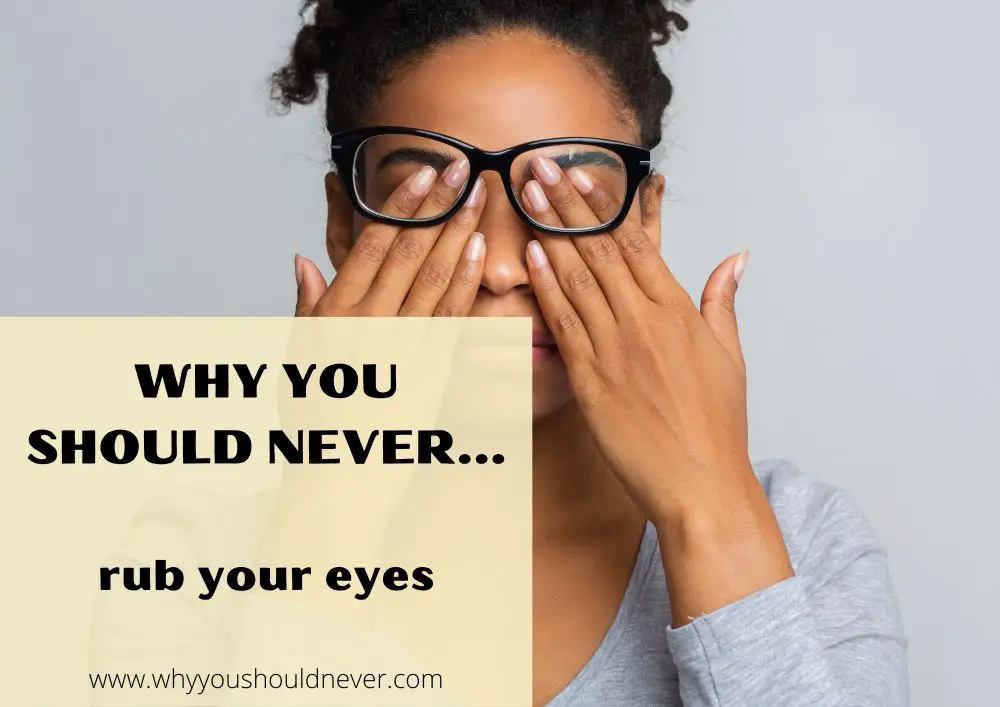![]()
Why You Should Never Rub Your Eyes
There are many reasons why you might find yourself rubbing your eyes. Maybe you’ve stayed up late scrolling through your phone and now your eyes feel tired and dry. Maybe you got a little something in your eye, so you think rubbing it will make the irritation go away. Or maybe, like some people, you just have a subconscious habit of rubbing your eyes when you’re feeling anxious or stressed.
It’s as natural as breathing, right? Most of the time, we do it subconsciously, not really sparing a thought for the repercussions.
But is this habit something you should be concerned about? Well, if you care about your eye health, then the answer is yes. Here’s why:
7 reasons why you shouldn’t rub your eyes
1. It can damage your cornea
Your eyes are incredibly delicate and sensitive organs. When you rub them with your hands, you risk damaging the cornea – the clear outer layer of the eye that acts as a protective shield against dust, germs, and other harmful particles.
The friction from rubbing your eyes too hard can scratch or even tear this thin membrane, leading to pain, sensitivity to light, and irritation.
2. You could introduce bacteria into your eye
Our hands carry countless bacteria at any given moment. Rubbing your eyes with your bare hands increases the likelihood of introducing those bacteria into your eyes, causing infections such as conjunctivitis (pink eye) or sties. These infections can range from mild to severe and may require medical treatment.
3. You might trigger allergy symptoms
Rubbing your eyes during an allergy attack is a natural instinct, but it could make matters worse for you. Rubbing discharges histamines that can cause more itching, redness and puffiness in your eyes instead of alleviating them.
4. It accelerates the aging of the skin around your eyes
Rubbing your eyes can be a contributing factor in the formation of wrinkles and fine lines around the delicate eye area. The mechanical act of rubbing causes wear and tear on sensitive tissues, resulting in premature aging of the skin.
5. It may worsen existing eye conditions
If you have an underlying eye condition such as glaucoma, rubbing your eyes can result in a sudden increase in intraocular pressure (IOP). This increased pressure could cause damage to the optic nerve that carries visual signals from the eye to your brain and lead to permanent vision loss over time.
6. You might inadvertently damage contact lenses
I can’t stress to you how many times I’ve unconsciously rubbed my eyes, forgetting that I have contacts in. It’s such an easy thing to do, especially after a long day.
If you’re wearing contacts and you rub your eyes, you not only increase the risk of them slipping out, but they could also move or be torn.
7. Most of the time, it doesn’t actually do anything
Although you might get temporary relief from rubbing your eyes, it usually doesn’t solve the underlying problem. For example, if your eyes are dry or tired from staring at a screen all day long, rubbing them won’t help reduce the dryness or strain.
What should you do instead?
So how can you alleviate eye discomfort without resorting to rubbing? Here are a few tips:
Apply a warm compress
A soft, damp cloth warmed in hot water and applied gently around your closed eyes could relieve dryness and fatigue.
Use eye drops or artificial tears
Over-the-counter lubricating eye drops (artificial tears) could provide immediate relief from dry itchy eyes. They also help flush out any irritants or bacteria trapped in the eye.
Blink more often
When staring at screens, we tend to blink less frequently than usual; this leads to dryness and strain on our eyes. Try blinking several times before resuming work.
Wear protective eyewear
If you engage in activities that could expose your eyes to harmful particles (e.g., woodworking, welding), always wear protective glasses or goggles.
Take a break
If your eyes are tired from staring at a screen, reading a book, driving etc., give those bad boys a rest! Take frequent breaks and look away from the screen or book. Try to focus on distant objects to give your eyes a chance to recover.
